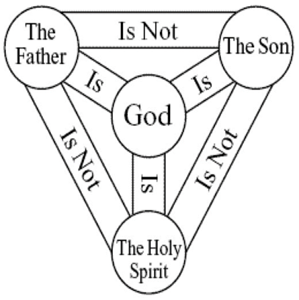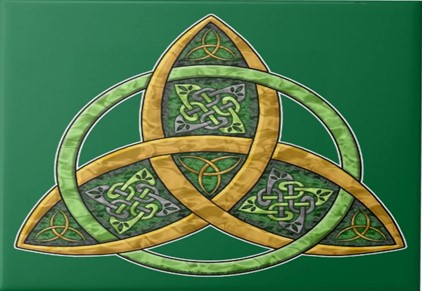Old Testament – Isaiah 48:12-22
New Testament – 2 Corinthians 13:1-14
This I Believe
“In the Triune Nature of God”
John 14:1-31
Wayne J. Edwards, Pastor
The doctrine of the Trinity is too much for the human mind to even begin to comprehend because it is impossible for the natural to explain the supernatural.
- The word “Trinity” is not in the Bible. Therefore, the Bible does not provide a hermeneutical definition of the term.
- However, the evidence of the Triune nature of God can be seen from Genesis to Revelation. Therefore, while we cannot truly explain it, we must believe it is essential to our Christian Faith.
- All true Christians believe in the doctrine of the Trinity. Those who haven’t settled this issue are not Christians because they are at odds with what the Bible declares as apostolic doctrines.
- For 2000 years, Christians have believed there is one God who exists in three co-equal and co-eternal Persons: Father, Son, and Holy Spirit; that they are one in being, united in essence, power, and purpose, yet distinct in their personality and function.
- The doctrine of the Trinity is the heart of the gospel.
- Without the doctrine of the Trinity, there would be no plan of salvation, no purpose in our worship, no power in our prayers, no holiness in our personal lives, and therefore, no witness to the unbelieving world.
- One theologian said, “Every error in Christian doctrine can be traced to a lack of understanding of what the Bible says about the triune nature of God.”
1. The Doctrine of the Trinity Explained – What do we mean when we speak of the triune nature of God?
- Trinity does not mean we believe there are three different Gods, or that God the Father, God the Son and God, the Holy Spirit are equal “parts” of one God – i.e., each share 1/3rd of the Godhead.
- Trinity means there is one God who has revealed Himself in three distinct persons.
- “Hear, O Israel: The Lord our God, the Lord is one.” – Deuteronomy 6:4
- “This is My beloved Son, in whom I am well pleased.” – Matthew 3:16-17
- “The Helper, the Holy Spirit, whom the Father would send in His name, would teach them all things.” – John 14:26
- “Go therefore and make disciples of all nations, baptizing them in the name of the Father, and of the Son, and of the Holy Spirit.” – Matthew 28:19
- “The grace of the Lord Jesus Christ, and the love of God, and the communion of the Holy Spirit be with you all.” – 2 Corinthians 13:14
 |
- God is one being – i.e., there is only one God.
- God has revealed Himself to us in three distinct, yet co-equal, and co-eternal persons, using the terms, Father, Son, and Holy Spirit.
|
- In the Old Testament, the doctrine of the Trinity is taught by implication:
- Genesis 1:1 says, “In the beginning, God,” – the Hebrew word for God is Elohim, which is a plural form of the word “El,” which means “might, strength, or power.”
- Genesis 1:26-27 says, “Let Us make man in Our image, so God created man in His own image, in the image of God He created him,” – notice the shift in pronouns from “Us” to “Him” and “He.”
- In the New Testament, the doctrine of the Trinity is taught by illustration:
- All three Persons are called “God” in many passages
- Galatians 1:1 – “through Jesus Christ and God the Father.”
- John 20:28 – “My Lord and my God.”
- Acts 5:3-4 – “Satan filled your heart to lie to the Holy Spirit. You have not lied to men but to God.”
- Matthew 3:13-17 – the people heard the voice of God the Father and saw the Holy Spirit descend upon Jesus like a dove as He was baptized in the Jordan River.
- 1 Peter 1:2 – “chosen by the Father, sanctified by the Spirit, and sprinkled with the blood of Jesus.”
- 2 Thessalonians 2:13 – “chosen by God, loved by the Lord, and sanctified by the Spirit.”
2. The Doctrine of the Trinity Examined – questions about the Trinity.
- The English word “Trinity” is not used in the Bible. However, neither are the words “Inerrancy” nor “Rapture,” but that doesn’t mean they are not essential to our Christian Faith.
- Some theologians prefer to use the term “Triune,” or “Tri-unity.”
- Some have tried to illustrate the Trinity in natural ways
- Water, Ice, and Steam
- Eggshell, Egg white, and Egg yolk
- Husband, Father, and Son
- Matter, Space, and Time
- Matter = mass, energy, and motion
- Space – length, height, and future breadth
- Time – past, present, and future
- They all fall short because the supernatural cannot be explained naturally.
- “The heavens declare the glory of God, and the firmament shows His handiwork.” – Psalm 19:1
3. The Doctrine of the Trinity Applied – i.e., how this doctrine is essential to our Christian Faith.
- The doctrine of the Trinity helps us comprehend the truth about the divine nature of God, which means He did not create mankind because He was lonely.
- Even before the foundation of the world, God was having fellowship within His own being, and He was satisfied.
- Francis Schaeffer said part of what it means to be created in the image of God is that we have an intrinsic desire for intimacy and to stay in contact with those we love, especially our parents and children.
- The doctrine of the Trinity is necessary in regard to our worship.
- The only reason we can truly worship God the Father is because our sins were forgiven through the sacrificial death of God the Son, and the only reason we received God the Son as our Savior is because we were convicted of our sins by the Holy Spirit, and convinced that God the Son was the Savior we needed. Ephesians 2:18
- The doctrine of the Trinity is necessary in regard to our prayers.
- While we address our prayers to God the Father, He only hears our prayers because we ask them in the name of God the Son. John 14:6, John 16:13-15
- But the fact is, according to Romans 8:26-27, since we do not know how to address God the Father, the Holy Spirit intercedes for us by taking the desires of our heart, interpreting them through God’s will, and communicates them to God the Father through groanings we cannot understand.
- The doctrine of the Trinity is necessary for our eternal salvation.
- When we were lost in our sins, God the Father so desired to redeem us that He sent His only Son to the cross to be our Savior, and God the Son loved God the Father so much, He offered Himself on that cross to pay for our sins. But it was God the Holy Spirit who drew us to see our sin, our need for a Savior, and Jesus Christ as the Savior we need.
- We were so lost that it took every member of the Triune God to save us, and that truth alone should drive us to our knees in unending prayers of thanksgiving.
“TO BELIEVE AND LOVE THE TRINITY
IS TO POSSESS THE KEY OF THEOLOGY.”
Charles Haddon Spurgeon







